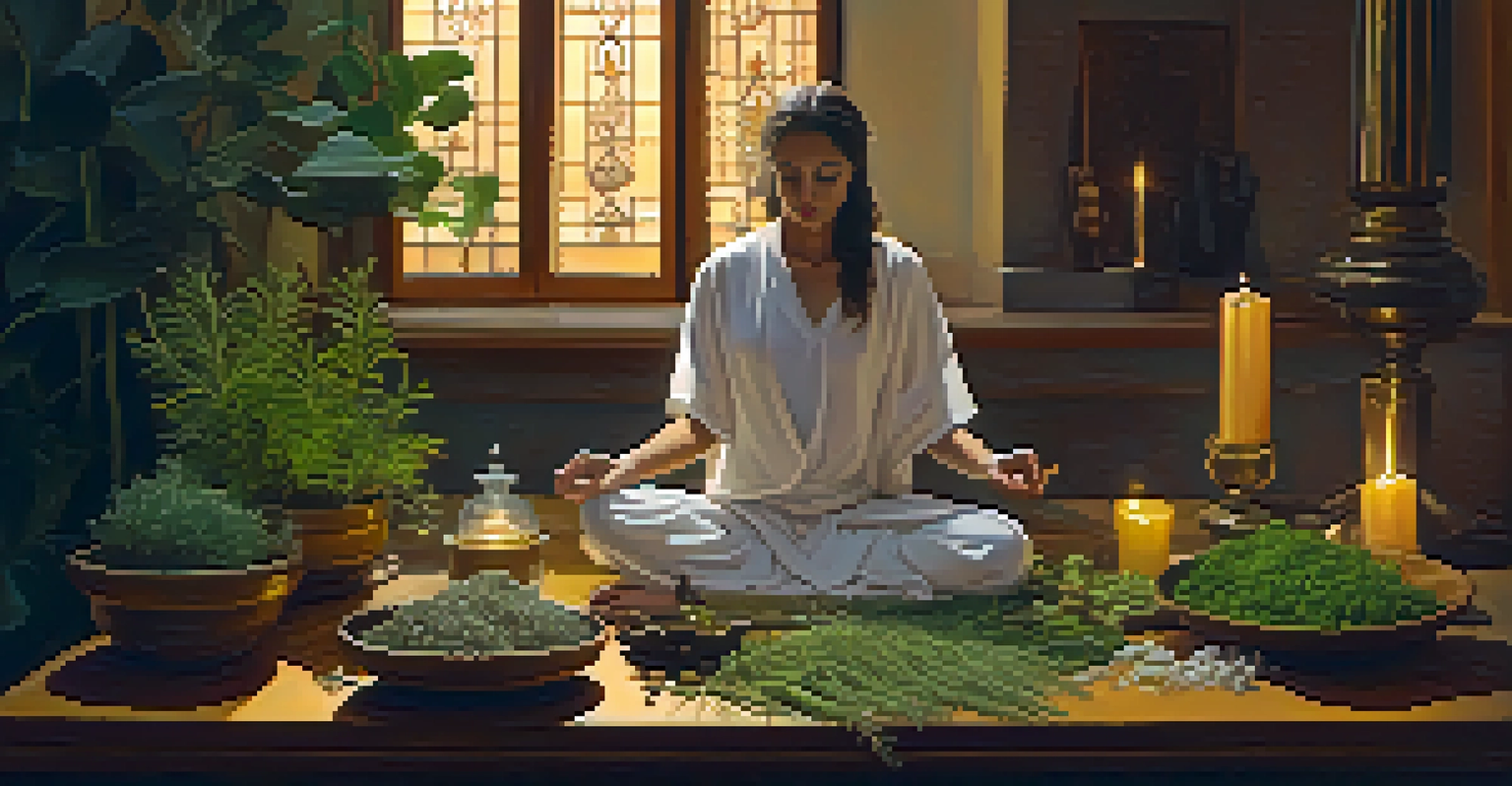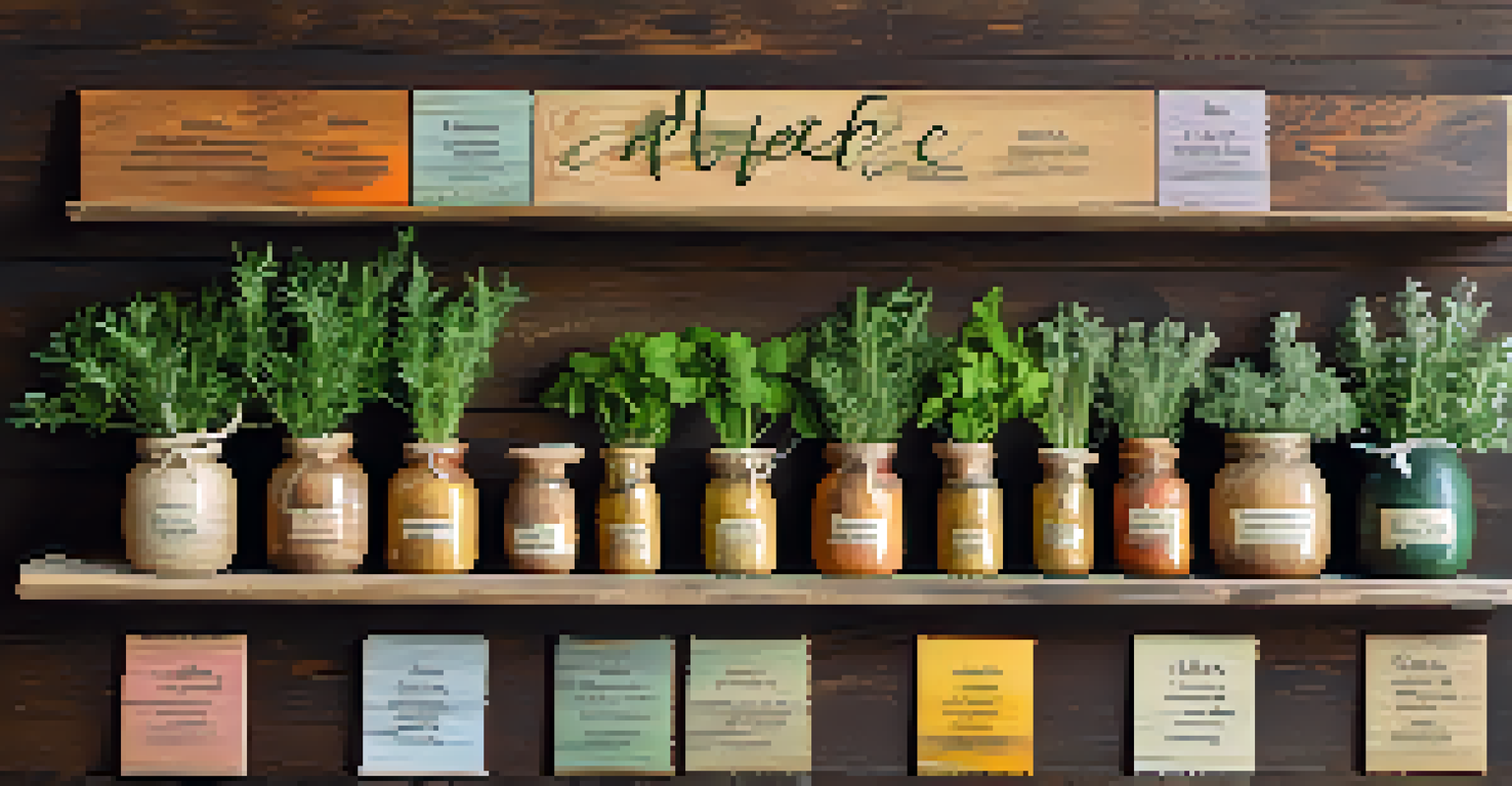The Connection Between Herbal Remedies and Spiritual Beliefs

Understanding Herbal Remedies and Their History
Herbal remedies have been used for centuries across various cultures, often rooted in ancient traditions. From the healing properties of chamomile to the calming effects of lavender, these plants have formed the backbone of natural medicine. Their history is not just about treating ailments but also encompasses spiritual practices that honor nature's gifts.
Herbs are the Earth's magic. They contain the power to heal, nourish, and elevate our spirits.
In many indigenous cultures, herbs were seen as sacred, believed to connect individuals with higher powers. Shamans and healers often utilized these plants not only for their physical benefits but also for their ability to enhance spiritual experiences. This historical context reveals how intertwined health and spirituality have always been.
As we explore the connection between herbal remedies and spiritual beliefs, it becomes clear that the two are not mutually exclusive. They often work in harmony, providing both physical healing and spiritual nourishment, making them integral to many holistic practices today.
The Role of Intention in Herbal Healing
Intention plays a crucial role in how herbal remedies are perceived and utilized. When someone approaches a herbal remedy with a specific intention—be it healing, protection, or spiritual growth—the experience can be profoundly enhanced. This belief aligns with many spiritual practices that emphasize the power of focus and energy.

For instance, someone might brew a cup of herbal tea not just for relaxation but as a ritual to invite peace into their life. This act transforms a simple beverage into a spiritual ceremony, bridging the gap between the tangible and the ethereal. Such practices highlight the importance of mindset in the effectiveness of herbal remedies.
Science Supports Herbal Traditions
Growing scientific research validates the mental health benefits of herbal remedies, bridging traditional practices with modern medicine.
As individuals embrace this connection, they often report deeper experiences with the herbs they use. Whether it's through guided meditations or mindful consumption, the act of setting intention can amplify the benefits of herbal remedies, making them more than just physical aids.
Herbal Remedies in Various Spiritual Traditions
Different spiritual traditions around the world incorporate herbal remedies in unique ways. For example, in Ayurveda, herbs are used not only for healing but also to balance the mind, body, and spirit. Each herb is believed to have specific properties that can enhance one's spiritual journey, emphasizing the holistic nature of this ancient practice.
The greatest medicine of all is teaching people how not to need it.
Similarly, in Native American spirituality, plants like sage and sweetgrass are used in purification rituals and ceremonies. These herbs are thought to carry spiritual significance, helping to connect individuals with ancestors and the Earth. This illustrates how cultures have long recognized the spiritual dimension of herbal practices.
Incorporating these herbal traditions into modern spiritual practices can enrich one's experience and understanding of both the herbs and the rituals. By exploring the diverse uses of herbal remedies in various spiritual contexts, we can appreciate their profound impact on human experiences across time.
The Science Behind Herbal Remedies and Spirituality
While spiritual beliefs often guide the use of herbal remedies, there's also a growing body of scientific research supporting their benefits. Studies have shown that certain herbs can have a significant impact on mental health, such as reducing anxiety or improving mood. This scientific validation provides a bridge between traditional spiritual practices and modern medicine.
For instance, herbs like ashwagandha and valerian root have been shown to help manage stress, which aligns with their traditional uses in spiritual practices aimed at promoting calmness and focus. This demonstrates that the healing properties attributed to these herbs are not just anecdotal but can be backed by empirical evidence.
Herbal Remedies Blend Healing and Spirit
Herbal remedies not only address physical ailments but also enhance spiritual experiences across various cultures.
As more research unfolds, it becomes increasingly clear that the connection between herbal remedies and spirituality is both profound and complex. Understanding the science behind these remedies allows us to embrace their spiritual significance while appreciating their tangible benefits.
Creating Your Own Herbal Rituals
Creating personal herbal rituals can be a rewarding way to enhance your spiritual practice. Start by selecting herbs that resonate with your intentions, whether it’s for relaxation, protection, or clarity. You might choose to create a calming herbal tea or a sacred smudge blend, allowing you to connect with the plants on a deeper level.
Once you've selected your herbs, consider how you want to incorporate them into your routine. You could establish a weekly ritual where you meditate with your chosen herbs, or perhaps create a small altar dedicated to your herbal allies. This not only honors the plants but also deepens your spiritual practice.
By infusing your daily life with herbal rituals, you create a space for mindfulness and intention. This connection can lead to greater awareness, bringing you closer to both the natural world and your inner self, making the journey all the more enriching.
Challenges and Misconceptions about Herbal Remedies
Despite the rich history and benefits of herbal remedies, there are challenges and misconceptions that persist. One common myth is that herbal remedies are always safe and free from side effects. While many herbs are gentle and healing, it's important to remember that they can interact with medications or cause adverse reactions in some individuals.
Additionally, the effectiveness of herbal remedies can vary widely from person to person. What works wonders for one individual may not have the same effect on another, leading to frustration or disillusionment. This highlights the importance of personal experimentation and seeking guidance from knowledgeable sources.
Intention Enhances Herbal Healing
The effectiveness of herbal remedies is significantly amplified when individuals approach them with clear intentions.
By addressing these misconceptions and challenges, individuals can approach herbal remedies with a more informed perspective. This not only fosters a safer experience but also encourages a deeper understanding of the unique relationship between herbs and spirituality.
The Future of Herbal Remedies and Spiritual Practices
As interest in holistic health continues to grow, the future of herbal remedies intertwined with spiritual practices looks promising. More people are seeking natural alternatives to pharmaceuticals, turning to herbs not only for their physical properties but also for their spiritual significance. This shift reflects a broader movement towards embracing nature and self-care.
Moreover, as technology advances, we can expect to see more research dedicated to understanding the efficacy of herbal remedies. This future could lead to better integration of herbal practices within mainstream health and wellness sectors, providing individuals with more tools for their spiritual and physical journeys.

Ultimately, the connection between herbal remedies and spiritual beliefs will likely continue to evolve. As we move forward, embracing this ancient wisdom alongside modern science can pave the way for a more holistic understanding of wellness that honors both body and spirit.